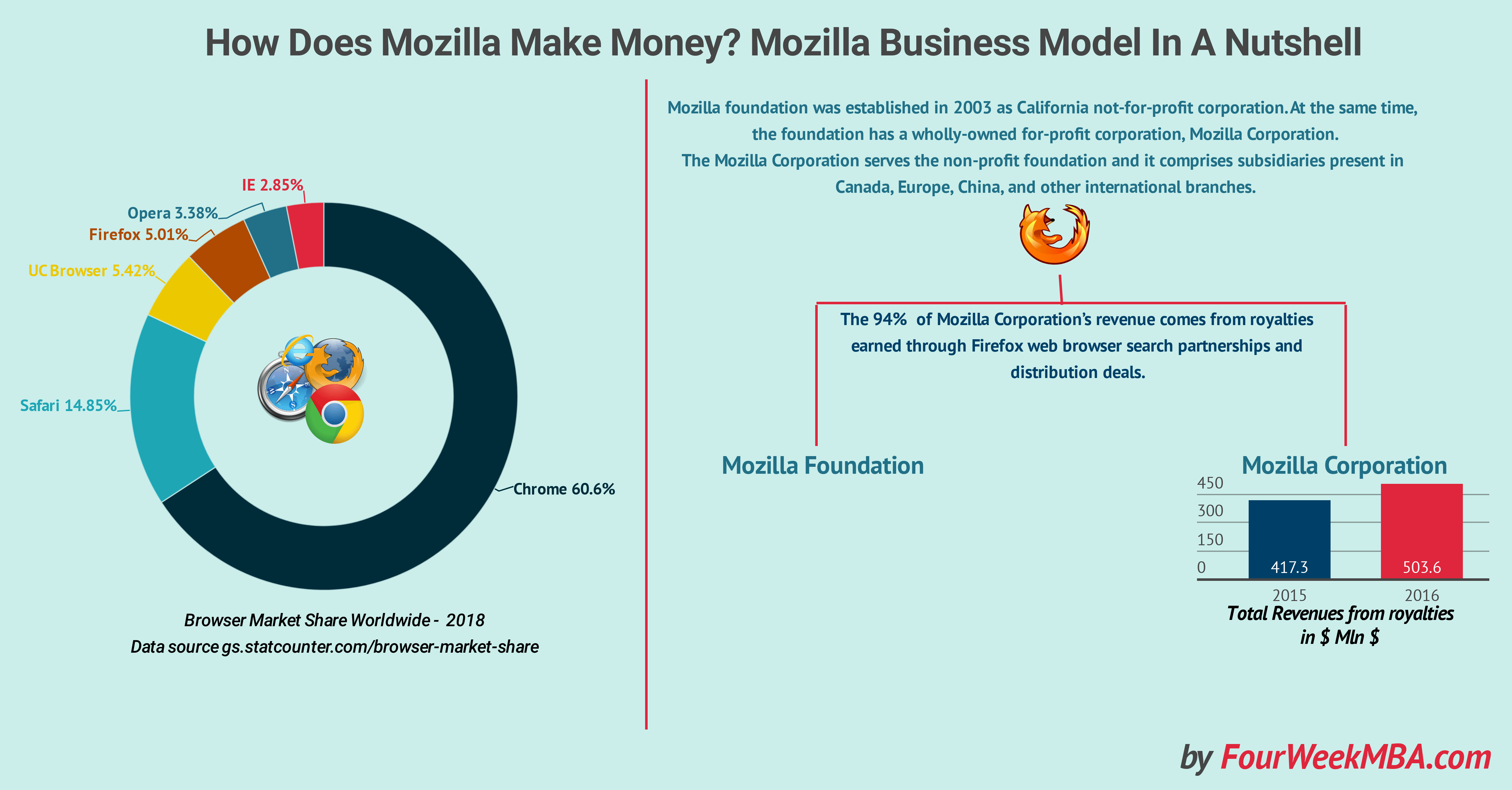| Not logged in : Login |
About: How Does Mozilla Make Money? Mozilla Business Model In A Nutshell Goto Sponge NotDistinct Permalink

The 94% of Mozilla Corporation’s revenue comes from royalties earned through Firefox web browser search partnerships and distribution deals. According to StatCounter back in 2008 Mozilla Firefox controlled over 26% of the browser market. Today, due to the market dominance of Google Chrome and Safari, Mozilla has a 5% market share. Mozilla corporate structure Mozilla foundation was established in 2003 as California not-for-profit corporation. At the same time, the foundation has a wholly-owned for-profit corporation, Mozilla Corporation. The Mozilla Corporation serves the non-profit foundation, and it comprises subsidiaries present in Canada, Europe, China, and other international branches. Mozilla monetization strategy The majority of Mozilla Corporation’s revenue is from royalties earned through Firefox web browser search partnerships and distribution deals. Precisely 94% of Mozilla revenues came through royalties received by search engines to be featured on its Mozilla Firefox browser. In 2017, Google closed a deal with Mozilla to be the primary search engine, by putting an end to a previous deal with Yahoo. As reported by Bloomberg, Firefox’s default search engine will be Google in the U.S., Canada, Hong Kong, and Taiwan. Previous to the Yahoo deal Googe was already the default search engine for Firefox until Yahoo promised over $300 million a year of royalties to Mozilla, which made it go with it. That might have caught by surprise Yahoo, which as pointed out on Bloomberg, by Charles Stewart, a spokesman for Verizon’s digital advertising business, Oath. We are surprised that Mozilla has decided to take another path and we are in discussions with them regarding the terms of our agreement. I pointed out in "Why Google Success Was The Fruit Of Its Business Distribution Strategy" how Google perfect execution in business deals made it the successful company it is today. We don't know yet how much Google offered to secure the deal with Mozilla again, but we can assume that it was a substantial offer. As for Mozilla Foundation philanthropic programs and activities, those are funded by public support from individual donors and foundations ($13.8M), and from royalties earned that are paid by the Mozilla Corporation ($8.3M). The anatomy of the Yahoo deal: did Yahoo make money from the deal with Mozilla? Distribution is a critical component of the search market. Search engines like Google, Yahoo, and Bing success depend on their ability to be featured on several devices on the web. The key middleman between a search engine and its user is a browser. While back in 2008 Google managed to launch its own browser, Google Chrome, Yahoo instead had to secure its distribution primarily via third-party browsers. As reported on Yahoo financials for 2016: For the year ended December 31, 2015, revenue and TAC increased $350 million and $660 million, respectively, or 8 percent and 303 percent, compared to 2014. As pointed out in the same report: The increase in revenue for the year ended December 31, 2015 was primarily attributable to an increase in search and display revenue resulting from an increase in revenue from distribution partners, including Mozilla Corporation (“Mozilla”) What were the additional revenues Yahoo recorded thanks to its Mozilla deal? This increase resulted from higher search volume on desktop due primarily to the Mozilla Agreement, which contributed $394 million If we stick to the number given by Yahoo financials, it seems to be $394 million in 2015. What cost Yahoo had to bear for that distribution and traffic acquisition? Cost of revenue—TAC for the year ended December 31, 2015 increased $660 million, or 303 percent, compared to 2014, primarily due to increased payments to distribution partners (including Mozilla which contributed $375 million) If we stick to this number, the traffic from Mozilla was priced for Yahoo at $375 million. Therefore, Yahoo recorded at least $19 million from the traffic coming by Mozilla Firefox. A quick glance at the browser market: Once the leader Mozilla is now Source: gs.statcounter According to StatCounter back in 2008, Mozilla Firefox represented over 26% of the browser market. Nowadays this percentage has declined substantially due in part to the market dominance of Google Chrome and Safari. The browser market has still critical and strategic importance for the search market. Indeed, in 2017 Google offered a few billion to be featured as default search engine on Safari. Therefore, keeping an eye on how the browser market is evolving is critical to understand who will be the dominant player in the search market. Other handpicked related business models: What Is a Business Model? 30 Successful Types of Business Models You Need to Know What Is a Business Model Canvas? Business Model Canvas Explained The Power of Google Business Model in a Nutshell How Does Google Make Money? It’s Not Just Advertising! How Does PayPal Make Money? The PayPal Mafia Business Model Explained How Does WhatsApp Make Money? WhatsApp Business Model Explained How Does Facebook Make Money? Facebook Hidden Revenue Business Model Explained The Google of China: Baidu Business Model In A Nutshell How Does Twitter Make Money? Twitter Business Model In A Nutshell How Does DuckDuckGo Make Money? DuckDuckGo Business Model Explained
| Attributes | Values |
|---|---|
| type | |
| label |
|
| label |
|
| sameAs | |
| Relation | |
| Description |
|
| depiction | |
| name |
|
| url |
|
| http://www.w3.org/2007/ont/link#uri |
Alternative Linked Data Documents: PivotViewer | iSPARQL | ODE Content Formats:
![[cxml]](/fct/images/cxml_doc.png)
![[csv]](/fct/images/csv_doc.png) RDF
RDF
![[text]](/fct/images/ntriples_doc.png)
![[turtle]](/fct/images/n3turtle_doc.png)
![[ld+json]](/fct/images/jsonld_doc.png)
![[rdf+json]](/fct/images/json_doc.png)
![[rdf+xml]](/fct/images/xml_doc.png) ODATA
ODATA
![[atom+xml]](/fct/images/atom_doc.png)
![[odata+json]](/fct/images/json_doc.png) Microdata
Microdata
![[microdata+json]](/fct/images/json_doc.png)
![[html]](/fct/images/html_doc.png) About
About


![[RDF Data]](/fct/images/sw-rdf-blue.png)
OpenLink Virtuoso version 08.03.3330 as of Mar 11 2024, on Linux (x86_64-generic-linux-glibc25), Single-Server Edition (7 GB total memory, 5 GB memory in use)
Data on this page belongs to its respective rights holders.
Virtuoso Faceted Browser Copyright © 2009-2024 OpenLink Software





